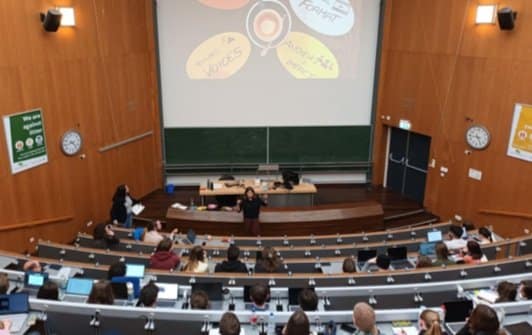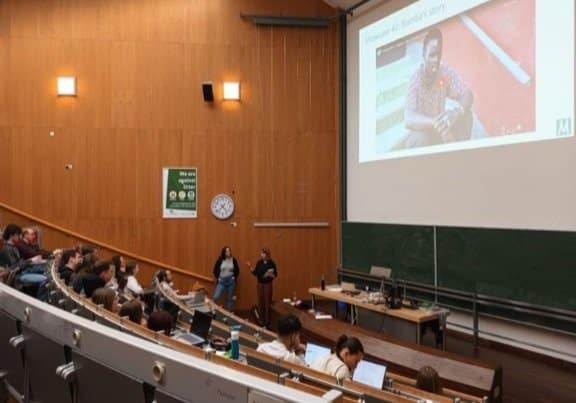By Selma Blanken, edited by Sophia Burton
At the end of February, the Migration Matters team visited our GAPs Return Migration partners at Radboud University in the Netherlands to lead a workshop called ‘Mediatization of Migration’ for a group of students. The workshop aimed to shed light on the impact of media framing of migration and its repercussions on societal discourse. It focused on the importance of counter-narratives in shaping perceptions and practices surrounding migration.
Approximately 30 students from various disciplines gathered on the Radboud University campus in Nijmegen to participate. Over the course of the workshop, they were equipped with tools to critically analyze and convey alternative narratives about migration. The session foregrounded diverse and creative mediums such as documentary series and podcasts, underlining the significance of inclusive storytelling.

Bernadette Klausberger explaining the multimedia design exercise
The workshop kicked-off with an icebreaker exercise, encouraging students to position themselves along a virtual line based on their perceptions of migration prompts. This activity sparked reflexive discussions on students’ personal connections, experiences, and attitudes towards migration. During the workshop, we screened diverse examples of our visual stories, such as “How many people migrate?” and “Migrant Lives in Pandemic Times: Bamba’s Story.” These videos highlight diverse perspectives on migration, including the academic viewpoint of Professor Hein de Haas and the perspective of Bamba, an undocumented migrant living in Bilbao, Spain.

Screening “Bamba’s Story” from the Migrant Lives in Pandemic Times project
Drawing from self-selected headlines on migration, participants engaged in group discussions to analyze dominant migration narratives and explore framing impacts. Prototyping this freshly gained knowledge, they were then invited to brainstorm on personal multimedia production ideas, aiming to reimagine a particular migration narrative through alternative protagonists, formats, and target audiences. One group chose to explore a narrative around return migration, specifically regarding pushbacks, a practice that keeps migrants from applying for asylum and is in violation of non-refoulement.
Overall, the workshop planted seeds for critical reflection and creative exploration amongst students of the Radboud University and underscored the significance of examining media representations of migration. By examining dominant discourses and promoting alternative narratives, the session aimed to challenge existing biases and foster a more inclusive dialogue on migration issues. It aimed to empower students with the skills to navigate and contribute to discussions surrounding migration and inclusion. Moreover, the session exemplified the power of collaboration between different partners and expertise in addressing complex societal issues on migration.